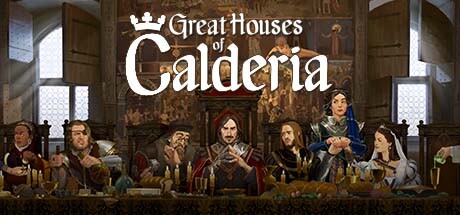Today, we would like to describe the House and character relations system in more depth. Everything in Calderia revolves around relationships, characters’ reputations and traits. Despite the stakes, it all comes down to interpersonal connections. Your deeds and your personality are pivotal in events and in negotiations.

The role of Heads of House and personal relationships
The relationships between the Heads of Houses, as leaders and representatives of their families, are at the center of all House relations. The official stance between two families is shaped by the mutual liking of their leaders. Your Head of House is the biggest influence on the way your House is perceived in Calderia. But that's just the tip of the iceberg. Specific deeds by family members can also add penalties or bonuses, affecting how Houses view one another on an individual level. The numeric values between Heads of House and individuals also have an impact on many actions and decisions that you will take. Of course, the Head of House holds influence, but it's not the only character you get to play! Each family member of your House is a playable character, and they have their own connections to all the other families.

These personal relationships between families can spill over, affecting all members. We decided to intertwine these relationships to add depth to the narrative, making family ties a more impactful aspect of gameplay. Talking about relationships inevitably leads to alliances, wars and conflicts in Calderia. Alliances aren't arbitrary—they're forged through marriage. It is a means to an end, more than a candid connection. Allies are useful assets to call upon in times of war.

Relationships based on personalities and reputations
In most events, whether diplomatic or trade-focused, relations between participants play a pivotal role. House relations, in addition to personal relationships, can influence outcomes. Some actions, like declaring war, require extremely negative House relations. Your Head of House must have bad relations with the Head of the House you want to start a war against. When it comes to trade, it isn't simply an economic activity in Calderia; it's a diplomatic tool and lever. Trading can improve or deteriorate relations between Houses. Fair deals foster goodwill, while exploiting others can strain relations. It's a nuanced system where every trade decision has consequences beyond material gains.

Relations with the Viceroy aren't just a formality or to be ignored—they impact the selection order of the Ranks of Calderia. As the game progresses, House relations with the Viceroy gain more and more meaning, influencing your standings in the Civil War, which we will add in the coming months.
Character traits play a fundamental role in interacting with one another and developing relationships. From personality and mood to the character's reputation, these traits establish basic relations between individuals, even when meeting for the first time. The dynamic interactions based on the personalities and other traits of the characters contribute to the intricate connections that Houses and families form in Calderia.

As demanding and complicated relationships can be, they cannot be overlooked when you are a noble seeking greater power and influence in Calderia.
This marks the end of this devblog on House and character relations. Want to contribute to the game's improvement? You can do so by sharing your feedback and suggesting what you'd like to see in the game on our Discord or Steam forums!
- ❄️ Great Houses of Calderia Team ???? -
